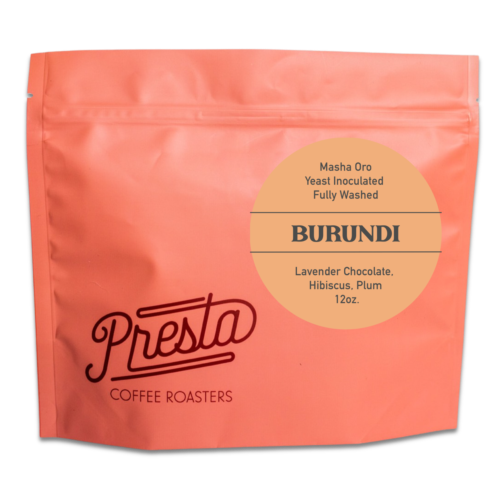
Burundi - Masha - Oro - Fully Washed
Origin: Burundi
Region: Kayanza
Farmers: 2000+ Smallholder Farmers
Average Farm Size: 250-300 Trees Average
Elevation:~1650 MASL
Processing Facility: Masha Washing Station
Varietal: Red Bourbon
Processing Method: Oro Yeast Inoculated, Fully Washed
Tasting Notes: Lavender Chocolate, Hibiscus, Plum
The Masha Washing Station, built in 1989, serves upwards of two thousand smallholder farmers. These farmers are have an average of 250 trees (many of them aging) that are grown and harvested by their families before being taken to the washing or collection station where they will be paid for the harvest. The coffee is grown alongside food crops and the small producers, who often have aging trees, have to make difficult decisions about when to remove the trees and plant new ones, which will take three to four years to start producing. Greenco, the company that runs the Masha Washing Station and collection centers, does a number of things to support the farmers including making additional payments to the farmers based on the quality produced, after providing the training to improve the quality and sustainability.
The washed process is when the coffee cherries have the skin and fruit mucilage removed shortly after picking. The cherries are initially sent through a pulping machine to remove the skin and majority of the mucilage before being soaked (fermentation) in large tanks to loosen any mucilage that remains attached, the beans are then flushed with water (washed) to rinse them clean. The drying can be done in a variety of ways, large industrial dryers for faster drying in less sunny places with a higher humidity, or, more often, they are dried on large concrete pads, and raised beds where the coffee needs to be turned by hand to ensure consistent drying. Finally the beans are sent through a dry mill to remove the final protective layer around the beans, the parchment layer. Once the parchment is removed the beans are ready for a final sorting.
The term "Fully Washed", points to a history of it being difficult for the small family farmers to get the cherries to a washing station quickly. The resulting processing was referred to as "Semi-Washed", where the farmer would do a portion of the processing at their home, removing as much of the pulp as possible, and drying the parchment coffee on tarps or patios outside the family home, before transporting the parchment coffee to a dry mill at a lower elevation so it could be milled and dry to the final moisture content.
At the Masha Washing Station, they use Oro Yeast in open holding tanks, where the cherries are soaked for 36 hours, making removal of the remaining fruit material easier. At this stage the parchment coffee is put onto raised beds to be dried for 2-3 weeks, being covered overnight and when it rains, and regularly being turned to make sure the coffee all dries evenly. After drying, the coffee goes through the dry mill to remove the parchment layer, and is finally hand sorted under UV lights, another measure to prevent defects in the final product that you get as a customer. Even though the washing station collects from so many family farms, the coffee is traced from the farmer all the way through the process, creating smaller lots that we get to pick from. This floral lot reminds us of lavender chocolate, hibiscus flowers, and the deep sweetness of a plum.
